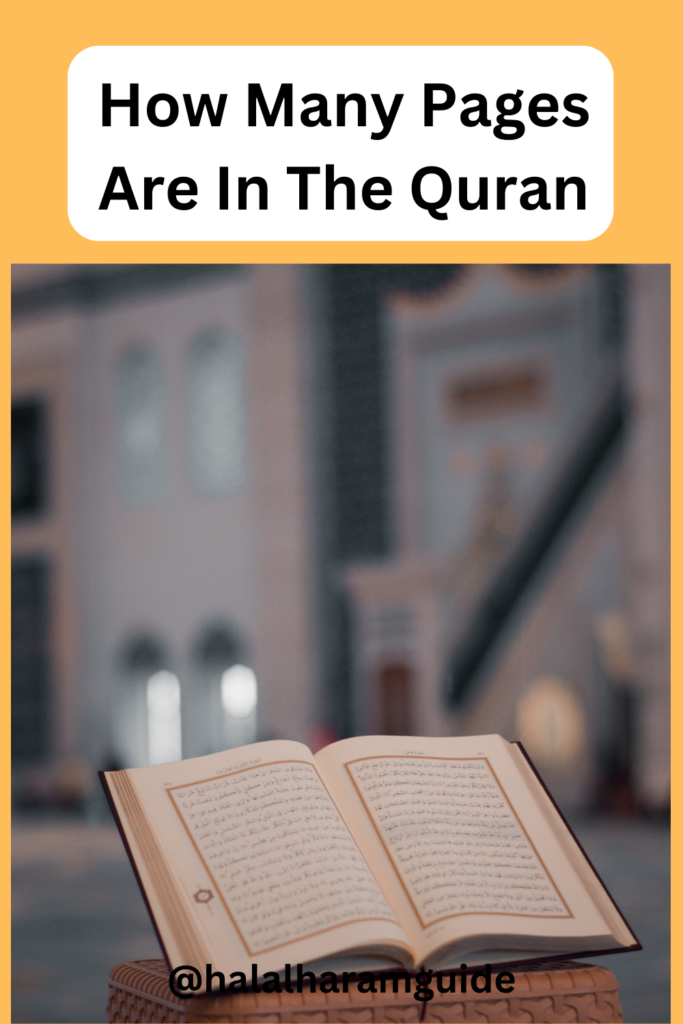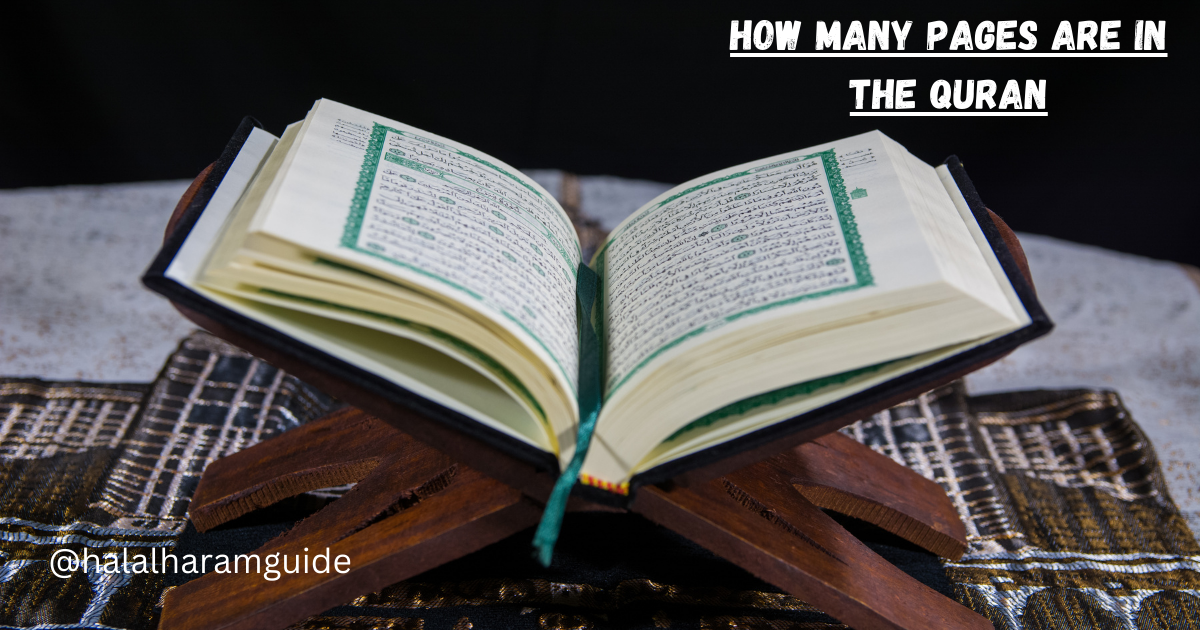Let’s talk about the topic, “How many pages are in the Quran?”
In the world of faith and spirituality, the Quran holds a unique and revered place. For Muslims, it is not just a book but the literal word of God, offering profound guidance and wisdom.
However, beyond its spiritual significance, many have wondered about the physical attributes of this sacred text. One common question that arises is, “How many pages are in the Quran?”
In this exploration, we delve into the tangible aspect of the Quran, shedding light on the various factors that contribute to its page count and why this question matters to both believers and curious minds alike.
Let’s start,
How Many Pages Are In The Quran
The Quran, the holy book of Islam, consists of 114 chapters, known as surahs. The number of pages in a printed Quran can vary depending on factors such as the size of the text, font style, and page layout used in the particular edition. In general, a printed Quran can range from approximately 600 to 700 pages in standard paperback or hardcover editions.
It’s important to note that Quranic pages are typically not numbered sequentially from 1 to the end but are instead numbered based on the surahs and verses (ayahs) they contain. The total number of verses in the Quran is over 6,000. The Quran is divided into 30 sections, known as juz’, to facilitate recitation during the month of Ramadan, with each juz’ consisting of a varying number of pages.
The Quran is written in Arabic, and translations into other languages may have different page counts due to variations in text size and formatting. If you’re looking for a specific page count for a particular edition or translation of the Quran, it’s best to refer to that specific publication.
Length And Structure Of Pages In The Quran
Surah Length:
Surahs in the Quran vary significantly in length, with some surahs consisting of only a few verses, while others contain many pages of text.
The longest surah in the Quran is Surah Al-Baqarah, which spans several pages in a printed Quran.
The shortest surahs, such as Surah Al-Kawthar, may only consist of a few lines or verses.
Verse Length:
Verses (ayahs) in the Quran also vary in length. Some verses are just a few words long, while others can span multiple lines or more.
The complexity of the Arabic language and the rich depth of meaning in Quranic verses contribute to this variation in verse length.
Standard Page Layout:
In a standard printed Quran, each page typically contains a specific portion of a surah or a group of surahs.
The Quran is divided into 30 equal sections, known as juz’ (plural: ajza’), to facilitate its recitation throughout the month of Ramadan. Each ‘juz’ corresponds to a specific portion of the Quran and typically spans a few pages.
Arabic Calligraphy and Formatting:
The Quran is often printed with beautiful Arabic calligraphy and decorative borders. These artistic elements can affect the layout and appearance of each page.
Numbering System:
Quranic pages are typically not numbered sequentially from 1 to the end. Instead, they are numbered based on the surah and verse they begin with.
The first page of a Quran may begin with Surah Al-Fatiha, which is considered the opening chapter, followed by the beginning of Surah Al-Baqarah.
The Significance Of The Quran In Islam
The Quran holds immense significance in Islam and is considered the most important and revered text in the religion. Its significance is multifaceted and extends to various aspects of Islamic faith and practice:
Revelation from God (Allah):
Muslims believe that the Quran is the literal word of God (Allah) as revealed to the Prophet Muhammad through the Angel Gabriel (Jibril) over a period of approximately 23 years. It is seen as the ultimate source of guidance from the Creator to humanity.
Spiritual Guidance:
The Quran serves as a comprehensive guide for Muslims in matters of faith, morality, ethics, and spirituality. It offers guidance on how to lead a righteous and pious life and provides solutions to the challenges and dilemmas that individuals and communities may face.
Source of Law and Jurisprudence:
Islamic jurisprudence (fiqh) is derived from the Quran. Legal scholars interpret the Quranic verses to formulate Islamic law (Sharia), which governs various aspects of life, including worship, family matters, contracts, and more.
Preservation of the Arabic Language:
The Quran has played a pivotal role in preserving the Arabic language. Its eloquent and intricate Arabic style has been a model of linguistic excellence for centuries, and it continues to be a source of linguistic study and inspiration.
Spiritual Nourishment and Reflection:
Muslims recite and memorize the Quran as an act of worship (Ibadah). The Quranic verses are recited in daily prayers (Salat), and Muslims are encouraged to engage in the reflection (Tadabbur) of its verses to deepen their spiritual connection with God.
Recitation and Memorization:
The Quran is often memorized in its entirety by devout Muslims, a practice known as “Hifz” or memorization. Those who successfully memorize the Quran are accorded a special honor and are called “Hafiz” or “Hafiza.”
Basis for Diverse Interpretations:
The Quran’s depth and richness allow for diverse interpretations, and various Islamic scholars and schools of thought have contributed to the understanding of its verses. This diversity contributes to a dynamic and evolving Islamic tradition.
Cultural and Artistic Influence:
The Quran has had a profound influence on Islamic art, calligraphy, architecture, and literature. Its verses are often incorporated into decorative elements and designs, and its recitation is considered a form of art.
Universal Message:
While revealed in a specific historical and cultural context, the Quran is believed to contain a timeless and universal message for all of humanity. It addresses fundamental questions about the purpose of life, the nature of God, and the human condition.
A Source of Comfort and Healing:
Many Muslims turn to the Quran for solace, guidance, and healing during times of personal or societal difficulties. Its verses are believed to offer spiritual comfort and a sense of peace.
How Many Pages Are In The English Quran
The number of pages in an English translation of the Quran can vary depending on the publisher, font size, and formatting used in a specific edition. However, a standard English translation of the Quran typically ranges from approximately 400 to 600 pages.
The length of the translation may also depend on whether the edition includes additional commentary or notes. If you have a specific English translation edition in mind, you can check its page count on the publisher’s website or by examining the physical copy.
How Many Verses Are In The Quran?
The Quran, the holy book of Islam, contains a total of 6,236 verses, known as ayahs. These verses are distributed across the 114 chapters, or surahs, of the Quran. The length and content of the verses vary, with some being very short and others longer.
The Quran is considered the literal word of God (Allah) and serves as the primary religious text for Muslims, offering guidance on matters of faith, morality, and daily life.
Explain The Importance Of Reciting The Quran By Muslims In Islam
Reciting the Quran holds profound importance in Islam, and it is a fundamental act of worship for Muslims. The significance of reciting the Quran can be understood in several key aspects:
Divine Guidance:
Muslims believe that the Quran is the literal word of God (Allah) as revealed to the Prophet Muhammad. It serves as a comprehensive guide for all aspects of life, offering divine wisdom and guidance on matters of faith, morality, ethics, law, and spirituality. Reciting the Quran allows Muslims to access this guidance directly.
Spiritual Connection:
Reciting the Quran is a means of establishing and strengthening one’s spiritual connection with God. It is a deeply personal and intimate act of worship that allows Muslims to draw nearer to their Creator and seek His guidance and mercy.
Act of Worship (Ibadah):
The recitation of the Quran is considered an act of worship (Ibadah) in Islam. It is a form of devotion and submission to God, demonstrating one’s obedience to His commandments. Muslims recite the Quran to fulfill their religious obligations and earn spiritual rewards.
Salat (Prayer):
The Quranic verses are an integral part of the Islamic prayer (Salat). During each unit of the daily prayers, Muslims recite specific passages from the Quran, including Surah Al-Fatiha, which is recited in every unit of prayer. These recitations enhance the spiritual experience of Salat and serve as a means of communicating with God.
Reflection and Contemplation (Tadabbur):
Muslims are encouraged to reflect upon and contemplate the meaning of the Quranic verses. This process of reflection, known as “Tadabbur,” deepens their understanding of the Quran’s teachings and helps them apply its guidance to their lives.
Conclusion
In conclusion, the number of pages in the Quran can vary depending on factors like font size, page size, and formatting in different editions. However, the Quran typically ranges from approximately 600 to 900 pages when printed.
It’s important to remember that the Quran’s true significance goes beyond its physical length, as it serves as the ultimate source of guidance, wisdom, and spirituality for Muslims worldwide, regardless of its page count.
Frequently Asked Questions
How Can I Finish The Quran In 30 Days?
To finish reading the Quran in 30 days, you can follow a structured plan that involves reading a specific portion of the Quran each day. Here’s a simple guideline on how to achieve this:
Divide the Quran into 30 Equal Parts (Juz’)
Determine Your Reading Time
Establish a Daily Reading Schedule
Consistency Is Key
Understand and Reflect
Additional Prayers (Taraweeh)
How Many Sides Does The Quran Contain?
The Quran is printed on both sides of each page in most printed editions. Therefore, it typically has two sides (front and back) on each page. In Arabic, the front side is read from right to left, while the back side is read from left to right.
The Quran Is How Long?
The length of the Quran in terms of word count varies depending on the script and edition. In the Uthmani script, which is the script used for Quranic text, there are approximately 77,430 words in the Quran. The Quran is divided into 114 surahs (chapters), with varying lengths, and a total of 6,236 verses (ayahs).
How many pages are in the whole Quran?
The Quran, when printed, can range from approximately 600 to 900 pages, depending on the factors mentioned earlier. The page count can vary among different editions and publishers.
How many pages is 1 Juz of the Quran?
Generally, 1 Juz’ of the Quran is approximately 20 pages in printed editions, but this can also vary slightly depending on the formatting and text size used in a specific edition.
Are there 30 or 114 chapters in the Quran?
There are 114 chapters, known as “surahs,” in the Quran. The Quran is not divided into 30 chapters; instead, it is divided into 30 equal sections known as “juz’,” which are intended to facilitate its recitation during the month of Ramadan. Each surah contains a varying number of verses (ayahs).
- “Is Lobster Halal? Understanding Its Permissibility”
- “Is Drawing Haram in Islam? Understanding the Perspective”
- “Is Fermented Kimchi Halal? Exploring Kimchi’s Halal Status”
- “Is Collagen Halal? Unveiling the Halal Status of Collagen”
- “Is Wine Vinegar Halal? Unveiling Its Permissibility”


